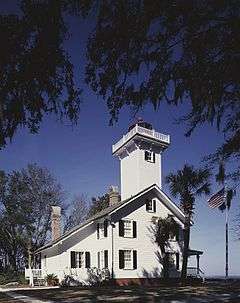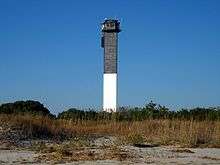Haig Point Range Lights
 | |
 | |
| Coordinates | 32°8′4.3″N 80°50′11.2″W / 32.134528°N 80.836444°WCoordinates: 32°8′4.3″N 80°50′11.2″W / 32.134528°N 80.836444°W |
|---|---|
| Year first constructed | 1873 |
| Year first lit |
1873 1986 Private (Rear) |
| Deactivated | 1924 |
| Construction | Wood |
| Tower shape | Square tower on roof of house |
| Markings / pattern |
White house and tower Red lantern |
| Height |
18 feet (5.5 m) (Front) 61 feet (19 m) (Rear) |
| Focal height |
17 feet (5.2 m) (Front) 70 feet (21 m) (Rear) |
| Original lens |
Steamer lens (Front) 5th order Fresnel lens (Rear) |
| Current lens | Acrylic |
| Characteristic |
Fl W 14s[1] |
|
Haig Point Rear Range Light | |
| Part of | Daufuskie Island Historic District (#82003831) |
| Added to NRHP | June 2, 1982[2] |
The Haig Point Range Lights were range lights on Calibogue Sound at the northeastern end of Daufuskie Island in Beaufort County, South Carolina. The Haig Point Range Lights were built in 1873 and were maintained as an official aid to navigation until about 1924. The Rear Range Light house has been restored. It is a guest house for the Haig Point Club and serves as a private aid to navigation.
Calibogue Sound is between Daufuskie and Hilton Head Islands. It connects the Intracoastal Waterway and the Harbour Town Marina with the Atlantic Ocean.
In 1871, the U.S. Congress authorized two sets of range lights on Daufuskie Island. The other range lights were the Bloody Point Range Lights on the south end of the island. Land was procured in 1872 at Haig's Point for the first set. The Haig Point range lights were lit in 1873.[3][4] Although most sources indicate that the range lights were deactivated in 1924,[3][4][5] others indicate that it was as early as 1922,[6] to as late as 1934[7][8] or 1938.[9]
Rear Range Light
.jpg)
The Rear Range light, built by James H. Reed, had a square tower on top of the light keeper's wooden, two-story Victorian house.[10] The foundation for the house rests on the Tabby cement foundation of an old plantation house. The house and tower are painted white. The lantern has a red roof. The light was a 5th order Fresnel lens with a kerosene lamp. Later, an electric light was installed. In addition to the house, an oil house, and a 6,000 US gallon (22,700 L) cistern were built. This light was manned until about 1924.[3]
In 1925, the house was sold. Over time, it passed through several hands and fell into disrepair. In 1984, the house was purchased by the International Paper Realty Corporation. They began a restoration of the house as a guest house of the Haig Point Club. The oil house and cistern remain near the lighthouse.[3]
In 1986, after about sixty years of darkness, a lamp was again activated in the Haig Point lighthouse. This light has an acrylic lens and is powered by solar cells and batteries. This flashing white light is a private aid to navigation.[4][9]
The rear range is a contributing property of the National Register of Historic Places' Daufuskie Island Historic District. The nomination form and an additional picture is available from the South Carolina Department of Archives and History.[10][11] In addition, the Beaufort County Historical Surveys for both the lighthouse and the oil house are available. These have recent photographs.[12][13]
Front Range Light
.jpg)
The front range light was a wooden structure with a lantern; the lighting apparatus was a steamer lens. The tower was located about 0.5 miles (0.80 km) south of the rear range light. This structure was movable to adjust to shifts in the channel. The fate of the front light after the station was closed is unknown,[1][4][9] although some sources list it as having been destroyed.[14]
References
- 1 2 Light List, Volume III, Atlantic Coast, Little River, South Carolina to Econfina River, Florida (PDF). Light List. United States Coast Guard. 2007.
- ↑ National Park Service (2008-04-15). "National Register Information System". National Register of Historic Places. National Park Service.
- 1 2 3 4 Burn, Billie, An Island Named Daufuskie, The Reprint Company, Inc., Spartanburg, SC, 1991, pp. 187-203, ISBN 0-87152-454-6.
- 1 2 3 4 Clary, Margie Willis, The Beacons of South Carolina, Sandlapper Publishing Co., Inc., Orangeburg, SC, 2005, pp. 59-67, ISBN 0-87844-176-X.
- ↑ Bansemer, Roger, Bansemer's Book of Carolina & Georgia Lighthouses, Pineapple Press, Sarasota, FL, 2000, pp. 96-97, ISBN 1-56164-194-4.
- ↑ "Historic Light Station Information and Photography: South Carolina". United States Coast Guard Historian's Office. Retrieved 2008-07-05. Daufuskie Island (Haig Point) Range Lights
- ↑ Roberts, Bruce, and Jones, Ray, Southern Lighthouses: Outer Banks to Cape Florida, 3rd ed., Globe Pequot Press, Guildord, CT, 2002, pp. 48-49, ISBN 0-7627-1243-0.
- ↑ "HAIG POINT (RANGE REAR) LIGHT". Inventory of Historic Light Stations South Carolina Lighthouses. US National Park Service. Retrieved 2008-07-08.
- 1 2 3 Zepke, Terrance, Lighthouse of the Carolinas, Pineapple Press, Sarasota, FL, 2002, pp. 153-157, ISBN 1-56164-148-0.
- 1 2 "Daufuskie Island Historic District" (PDF). National Register of Historic Places Inventory - Nomination Form. South Carolina Department of Archives and History. Retrieved 2008-07-05.
- ↑ "Haig Point Lighthouse". Daufuskie Island Historic District. South Carolina Department of Archives and History. Retrieved 2008-07-06.
- ↑ "Haig's Point Lighthouse" (PDF). Beaufort County Historical Survey - 1997. Beaufort County, South Carolina. Retrieved 2008-07-15.
- ↑ "Haig's Point Lighthouse, Oil House" (PDF). Beaufort County Historical Survey - 1997. Beaufort County, South Carolina. Retrieved 2008-07-15.
- ↑ "Lighthouse Depot". Lighthouse Explorer database. Lighthouse Digest. 2008-07-18.
